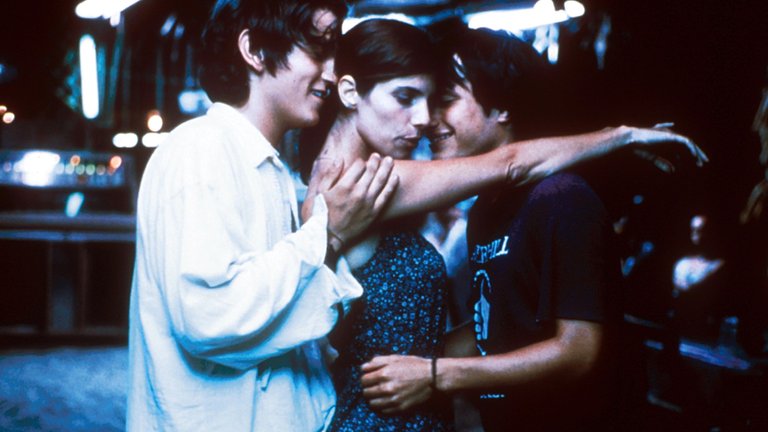Film Review: Y tu mamá también (And Your Mother Too, 2001)

Times of transition tend to be the fruitful for artists, at least those who know how to exploit situation when the old system is ending and new one isn’t established yet. One such transition occurred in 2000, with the end of the PRI party's seven-decade rule. One of those who exploited such opportunity was film director Alfonso Cuarón, whose 2001 film Y tu mamá también (“And Your Mother Too” in English) became a massive hit in Mexico and solidified his reputation as a global cinematic force.
The plot begins with two teenage boys from Mexico City - Julio Zapata (played by Gael García Bernal) and Tenoch Iturbide (played by Diego Luna) - who are best friends despite former belonging to upper, and latter to middle class. Their girlfriends have went to a trip to Europe, thus allowing them plenty of free time to indulge in smoking marijuana and fantasising about other women. Tenoch brings Julio to his distant cousin’s wedding where they meet Luisa (played by Maribel Verdu), beautiful Spanish wife of their cousin Jano (played by Juan Carlos Remolina). They both flirt with her and try to impress her with made up tale about “perfect” beach called “Heaven’s Mouth” and ask her to join them there when they go on a trip. They don’t think much about it, but when Jano admits infidelity to Luisa, she reacts by asking them to act on their promise. Julio and Tenoch don’t have a clue where to go, but opportunity to spend quality time with beautiful woman is irresistible. The trio goes on a journey during which they would experiences all kinds of adventures and discover some truths about themselves.
Y tu mamá también is a road film, a genre immensely popular among critics and that might explain why Cuaron won many good reviews. The genre, however, allows Cuarón to make insightful observations about Mexico's socio-economic divisions and the stark contrast between the "hip" developed urban metropolis of Mexico City and the undeveloped impoverished rural areas of Oaxaca, with military checkpoints serving as a reminder of the precariousness of democracy in Mexico. Obviously inspired by classics of French New Wave, the film benefits a lot from cold and perceptive narration by Cuaron’s brother and co-writer Carlos whose work would ultimately win Best Screenplay Prize at Venice Film Festival.
The film also, at least in part, functions as teen comedy, and, as such, allows Cuarón to explore the male teenage characters' indulgence in activities typically associated with their demographic, such as drugs and sex. Cuarón does it in more explicit manner than similar Hollywood films, which led to his work being a classic example of succès de scandale due to controversy over graphic nature of sex scenes, including famous threesome scene near the end. Those scenes, although not much different than those viewers can encounter on Netflix and other streaming services today, created problems with censorship both north of the border, where notoriously prudish MPAA Ratings Board caused the film to be distributed without rating and in Mexico itself, which Cuarón later explained with politicians being unhappy over the country being portrayed in unflattering light.
The film's success is also due to its inspired cast. Gael García Bernal, who became a star with Amores perros the previous year, was chosen by Cuarón, while Diego Luna was initially rejected due to his association with telenovelas and reputation of teen idol. However, Bernal' insisted that Luna, his childhood friend, be brought in and his persistence paid off. The two young actors have great chemistry, making their performances more convincing. Maribel Verdu, who plays the older woman, also delivers a standout performance. Initially introduced as a male teenage sex fantasy, her character gradually develops into the most realistic and mature of all.
Y tu mamá también begins as a light-hearted sex comedy but gradually becomes a darker and before the end into serious drama with conclusion it is difficult not to describe as tragic. While the plot revelation at the end makes sense, some audiences may feel cheated by somewhat abrupt transition from youthful idyll to harsh realities of adulthood. Nonetheless, Cuarón's film remains a powerful work of one of 21şt Century’s most respected film makers and one of the more memorable achievements of modern Mexican cinema.
RATING: 7/10 (+++)
Blog in Croatian https://draxblog.com
Blog in English https://draxreview.wordpress.com/
InLeo blog https://inleo.io/@drax.leo
Hiveonboard: https://hiveonboard.com?ref=drax
Rising Star game: https://www.risingstargame.com?referrer=drax
1Inch: https://1inch.exchange/#/r/0x83823d8CCB74F828148258BB4457642124b1328e
BTC donations: 1EWxiMiP6iiG9rger3NuUSd6HByaxQWafG
ETH donations: 0xB305F144323b99e6f8b1d66f5D7DE78B498C32A7
Posted using CineTV